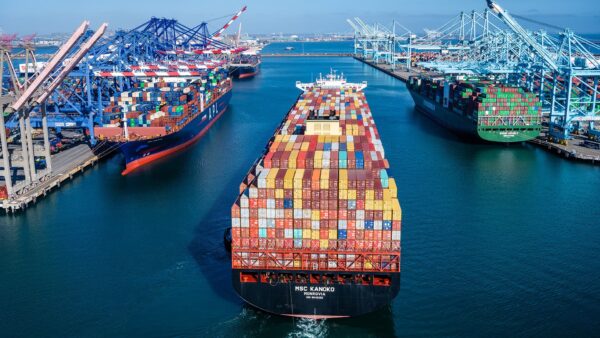Driving Connectivity Among Govt Agencies

Barring the activities of fifth columnists or those bent on frustrating efforts at repositioning the ports, the move by frontline stakeholders and well-meaning Nigerians to create synergy among the ministry of transport agencies may just be the needed boost to rally forces from the economy gateway to launch the country back out of recession.
From investigations, the nation will attract more investments if the agencies learn to collaborate rather than see themselves as organisations trying to outdo one another to get public accolade or government commendation.
At close glance, the very active agencies are the Nigerian Port Authority (NPA), Nigerian Maritime Administration and Safety Agency, NIMASA, Nigeria Shippers Council (NSC), Nigerian Inland Waterways Authority (NIWA), Nigerian Railway Corporation (NRC). One will also add the Nigerian Customs Service which though not under the transport ministry is a major force at the ports which must work with all the others mentioned to help actualise its mandate.
Stakeholders have variously pinpointed the uncoordinated regulatory framework and interagency rivalry among the very groups and some have even called for the passing into lawof the National Transport Commission Bill in order to address the conflicts of interests.
It is in the industry that you discover that between the Nigerian Maritime Administration and Safety Agency (NIMASA) and the Nigerian Ports Authority (NPA) there are conflicts of interest over wreck removal; between NIMASA and the National Inland Waterways Authority (NIWA) there is unhealthy rivalry over who controls the inland waterways and this has negatively affected the industry.
The Nigerian Customs Service has also clashed with the Nigeria Shippers Council in some of the overlapping areas but the NCS as a purely revenue generating agency of government will record more success through interagency information sharing. Even at the border the successes at combating smuggling is made possible through cooperation from agencies like NAFDAC and Immigration.
Also with the support of the Nigerian Shippers Council, the Customs will have more leeway with documentation on imports which most shippers try to doctor to bamboozle the revenue collectors. The more information at its disposal, the easier it is for the organisation to meet set target by the government.
Analysts believe that instead of conflict, NPA and NIMASA could actually collaborate on such areas of conflict and will even help give each other information when they notice some intrusions in their domain while also watching the others back. The same goes for NIMASA and NIWA or even NSC in case each is seen as venturing into areas that other agencies do not feel comfortable about.
Although proposed the National Transport Commission Bill will ultimately create an economic regulatory framework for the provision of transportation services and facilities, facilitate effective competition, promote competitive markets and ensure that the misuse of monopoly power is prevented in the provision of transport service, the agencies themselves must understand the meaning of collaboration if the bill must be effective when passed into law.
In the entire maritime industry stakeholders have actually commended two agencies as creating the rallying point for collaboration and coordination. The immediate past DG of NIMASA once told industry stakeholders that “The era of competition is over. We are now in the era of collaboration because the goal is to make Nigeria a maritime hub in the African continent. Regular meetings among the leadership of NIMASA, NSC, the Nigerian Ports Authority (NPA), the National Inland Waterways Authority (NIWA), the Railway Corporation and the Maritime Academy of Nigeria, Oron will definitely provide the adequate forum to rub minds and jointly propose solutions to the executive and legislative arms of government,’’ he declared.Also the present DG, Dr. Dakuku Peterside, right from assumption of office, called on relevant government agencies especially ‘security–oriented ones’ to work together to enable them unlock synergistic benefits of joint efforts for the security of the nation’s maritime sector.
“Security is not the responsibility of any one government Agency, hence the need for synergy and collaboration between relevant government bodies. The interest of the country must be placed above individual interest as such we must be willing to share ideas and information in this partnership”, Peterside said.
He said both government bodies were economic gate keepers that were working towards ensuring safety and security in there designated statutory duties; and expressed the readiness of NIMASA to work closely with other agencies to actualize its mandates.
NIMASA said that Peterside had in recent times intensified co-operation security-wise with the office of the National Security Adviser; the Nigerian Navy; the Nigerian Army and the Nigerian Air Force to strengthen maritime security in Nigeria and by extension the Gulf of Guinea.
An important thread that runs through all the agencies mentioned is that they are specifically set up to play regulatory functions and to generate money for the government. Since it is paramount that they play these roles well, analysts believe that in looking at their core mandate none will be able to achieve it successfully without collaboration.
Recently the managing director of the Nigerian Ports Authority Hadisa Bala-Usman said the Authority was looking at working with the NCS to create the enabling environment for ease of doing business at ports and for effective cargo clearing.
She also emphasised the need to collaborate with The Nigerian Railway Corporation (NRC) to facilitate movement of cargo by rail which those before her relegated to the backroom in spite of the necessity.
Analysts unanimously agree that at the nation’s ports, the Nigerian Shippers Council has remained a trailblazer in getting the other agencies to a roundtable beyond newspaper rhetoric.
Executive Secretary, Nigerian Shippers’ Council (NSC) Hassan Bello was quoted as saying recently when the Comptroller General of Customs, Hameed Ali paid him a courtesy visit that one of the problems faced by the maritime sector is lack of collaboration and “uncoordinated acts” of government agencies at the port.
“In the port system, you cannot but cooperate and collaborate because the port is a community and it is very important that you synergise so that the industry could move forward.“That is what is lacking. We believe in equilibrium and balance and working relationship between all the interested parties,” he said.
He said the existing collaboration between the NSC and Customs has helped promote transit trade, which would soon see Niger Republic and Chad begin importing their cargoes through Nigerian ports.
“The NSC has been working with the operators in Niger and we have got a lot of support from Customs.“Customs has removed 90 percent of barriers and we are in no short time about to see Niger first and Chad coming back to Nigeria. This signifies the benefit of cooperation,” he said.
While calling on the government to eliminate all barriers to seamless cargo clearance at the port, Bello said there was an urgent need for government to invest in massive infrastructure development including roads, rails lines and waterways.
He said it was the responsibility of the government to provide conducive atmosphere for businesses to thrive and also to protect investment of service providers.“It is very important that government be told the truth. Government sometimes also has a share of the problems that is happening. Access to the port is not very good. No matter how efficient our terminals are, if shippers cannot get their cargoes out on time, then there is a problem.“Government owes it a duty to the investors to protect their investment, provide electricity and also provide the right atmosphere so that the port system will thrive. Government should be consistent for predictability and certainty. There has been some policy somersault which is not good for investment,” he said.
Speaking earlier, Ali assured that he will further strengthen the existing collaboration and relationship between both agencies.He said, “We want to create an understanding. I know we have been working very closely with you but we want to further cement that bond. We want to make it a relationship that will be an everyday interaction.
“Sometimes we don’t get the records we desire to be able to assess and make sure we do our jobs. The papers that are presented, the manifest most especially comes to us with a lot of problems. Some of them are falsification of documents, some of them not having correct description of the goods.
“For instance, in the manifest they will tell you they are carrying chemicals but chemicals are in categories. So it now behoves on us to begin to wonder what types of chemicals.So these are areas that we are finding it a little bit difficult to sort out and we think since we are with you here, we need to let this before you that if you can assist us it will go a long way in doing our job,” he said.
Bello also thinks that collaboration should extend to the private sector. “It is important that the Nigeria Shippers Council work with the private sector closely this is what we are poised to do. It is important that the value chain should be intensified and articulated, the council will articulate its new port order and the hallmark of the new port order is continuous consultation with the private sector operators and all other stakeholders in government such as Nigeria Railway Corporation (NRC), National Agency Foods and Drugs Administration and Control (NAFDAC)).
“There have been a lot of consultations and the government agencies operating in the ports all have one goal. Nigeria Customs Service has one goal. That is, trade facilitation, increase revenue by blocking leakages and loopholes in the system. This applies to the Nigerian Maritime Administration and Safety Agency (NIMASA), NSC and NPA. Our roles and responsibilities are geared towards repositioning the sector. The Council was able to channel this energy through active consultation. The important thing is that there should be collaboration and synergy. This is due to the fact that synergy is key to ports operations because of the chain of interests, issues and stakeholders, no matter there must be unionism”, he said
From research, no port has ever made maximum impact without inter and intra agency collaboration. The Malaysian Maritime Enforcement Agency said recently that it will continue to work closely with other international maritime agencies to check on criminal activities in the country’s territorial waters.Its criminal investigations division director First Admiral Datuk Zulkifli Abubakar said the agency could not manage the country’s coastline entirely on its own.
Zulkifli said some of the cases reported involved transborder crimes in international waters and needed the assistance of other enforcement agencies.“All enforcement agencies must work together to combat the threat of criminal activities in today’s challenging and borderless world,’’ he declared.
Also the Sierra Leone Maritime Administration (SLMA) recently came to solicit the support of the Nigerian Maritime Administration and Safety Agency (NIMASA) for the training of its personnel.
Chairman of SLMA, Mr Lansana Dambuya who led a delegation of some board members to NIMASA, said that the SLMA thought it wise to partner with NIMASA, one of the leading Maritime Administrations in Africa and to seek areas of collaboration for the benefit of both countries.The delegation canvassed for the endorsement of a Memorandum of Understanding (MoU) with NIMASA that will give the opportunity for the exchange of ideas among staff, to not only develop their capacities but also further cement the bond between the two countries
In today’s world, there are few places as relevant to national security or as potentially hazardous as the open ocean. Known for its unpredictability and resistance to man’s attempts at control, the sea is relatively lawless zone through which travels the vast majority of global trade. Over 184,000 ships exceeding 100 gross tons navigate the oceans between more than 10,000 ports worldwide, carrying more than 1 million seafarers and 20 million shipping containers on board.
In addition, there are numerous vessels used for fishing, research, recreation, military, and other special purposes, exponentially muddling the maritime picture.
Hidden among legitimate transport activities, and often characterized by opaque ownership records and multiple levels of agents are vessels that, knowingly or not, provide opportunities for criminal enterprise. Theft, fraud, contraband smuggling by transnational crime syndicates, rogue state and non-state traffickers in drugs, humans, weapons, and other controlled/potentially hazardous substances use the relatively unregulated, porous system of oceans and ports to further their illegitimate trade.
Terrorist organizations not only use the maritime transport system to ship personnel and supplies across borders in order to facilitate their global activities, they also make it a target for attacks. Past successful attacks within the maritime domain still stick out like sore thumb in the memory. Such attacks have repercussions that extend beyond the human casualties and the immediate physical and financial damages: insurance prices increase, business practices are more cautious, and additional security measures and regulations add cost and delays.
State interest in shipping security extends beyond criminal subversion or terrorist attack. The industry is opaque and lacks sufficient oversight by many flag states. Competition causes many stakeholders to seek ways to increase thin profit margins. Vessel owners and operators may cut corners and skirt safety regulations, leading to reckless and unsafe business practices. Environmental contamination is a constant threat from leaks or spills by vessels transporting oil, chemicals, or other potentially hazardous substances.
This is why collaboration among agencies specifically mandated to run the ports remains the key to co-ordinated achievement.








